Tourism, a bedrock for national development
The Ghana Tourism Authority was established by the Tourism Act, 2011 (Act 817). It replaced the Ghana Tourist Board which was established by NRCD 224 in 1973 as amended by SMCD 80 of 1977.
The Ghana Tourism Authority is the Public Service agency in charge of regulating tourism in Ghana through marketing and promoting, licensing and classification of tourism facilities and services, research and other tourism developmental projects.
The mission of the Ghana Tourism Authority is to ensure sustainable tourism development through the creation of enabling environment for the provision of quality tourism facilities and services – like the National Theatre, Kwame Nkrumah Memorial Park, W.E.B Du Bois Centre, Ghana Museums and Monuments Board as well as many others for the travelling public with a well-qualified, highly motivated and dedicated workforce.
As the main implementing agency of the Ministry of Tourism, Arts and Culture, its functions include the regulation of tourism enterprises namely accommodation, catering, travel and tour, charter operations, through registering, inspecting licensing and classification. Also the promotion of tourism in Ghana and abroad, including the publication of tourism publicity and promotional materials, participation in fairs and exhibition.
Ghana as an African country has a long stable democracy and healthy economy that makes it a safe place and an all-weather travel destination for all and sundry. From our rich Ghanaian cuisines and languages to our culture and beautiful tourist sites/attractions is definitely inevitable to yearn for an expedition.
Some key priorities to augment tourism’s role in preserving and promoting Ghana’s culture includes the need for championing cultural tourism, for instance by closely integrating cultural tourism policies and planning.
Again, safeguarding tangible cultural heritage by closely monitoring the capacity of cultural sites and destinations and also engaging local communities and hence revitalise the creative arts, historic buildings and even entire neighbourhoods- for example, promoting promising avenues like food or culinary tourism.
With the above said, tourism, therefore, contributes significantly to our economic growth worldwide. As a sector, it is the third-largest contributor to global Gross Domestic Product (GDP) of tourism arrivals at an exponential rate indicating that tourism offers jobs for a range of individuals from low skilled to highly skilled workers.
In Ghana, the tourism sector can boast of numerous industries within the value chain including accommodation, medical centres, agriculture, aviation, entertainment and public transport.
Tourism is more than, being a mere part of the global economy thus specifically seem like a means of furthering inclusive growth that is about increasing opportunities from all, based on the principles of equity and leaving nothing behind. As a people-centred activity, tourism plays a role in spearheading inclusiveness particularly for under-represented groups – including women, the youth and those with special needs.
The myriad between tourism and culture contributes to inclusive, sustainable development that presents notable opportunities for safeguarding Ghana’s cultural heritage including initiatives to restore traditions across various regions. To sum it up, effective governance policy and tool is the bedrock for sustainable development.
As a collaborative effort, the tourism industry is the face of the nation and has a great future as it helps produce results when partnerships are formed between international organizations, government department forums, civil societies, local communities to mention a few. This, therefore, supports that Tourism is a bedrock for national development.
Dosu Edith Elorm, NSP-GTA
edilorm349@gmail.com
Video: ‘Come to Ghana’ – Sarkodie appeals after winning BET Hip Hop award
Rapper Sarkodie has urged African-Americans to come home as Ghana marks the Year of Return this year.
The rapper made the appeal after emerging the first winner of the Best International Flow at the 2019 BET Hip Hop Awards.
The most decorated musician in Ghana’s music history beat Falz (Nigeria), Ghetts (U.K.), Kalash (France), Lil Simz (U.K.), Nasty C (South Africa), Tory Lanez (Canada) to be the first act to win that award.
While receiving the award at a ceremony which was taped at the Atlanta’s Cobb Energy Center on October 5, Sarkodie used the opportunity to urge patrons and the world to visit Ghana.
“This year is the Year of Return and I will urge each one of you here to take a trip back home….it’s going down in Ghana so if you are coming to Africa choose Ghana,” he said.
This year marks exactly 400 years since the first black slaves landed in Jamestown Virginia in the U.S.
The initiative urges Africans in the diaspora to come back home and so far, it has seen an impressive array of celebrities, including Steve Harvey, make their way to Ghana to explore, learn and appreciate their roots.
Sarkodie also dedicated the award to his daughter, Adalyn Owusu Addo (Titi).
“I want to say a big thank you to the almighty God, to my family. This one is for my little girl (Titi)…”
He also gave shout outs to singer Akon with whom he has an interesting history with.
Sarkodie was never signed to Konvict Music – Akon
This will not be the ‘Illuminati’ rapper’s first nomination at an awards scheme organised by BET.
He has been nominated three times – in 2012, 2014 and 2015 – for the BET Awards in the ‘Best International Act’ category. He jointly won the award in 2012 with Nigerian musician Wizkid.
With over 81 awards from 148 nominations to his credit, the rapper is unmatched in the Ghanaian music space and he is adding BET Hip Hop Awards plaque to his impressive collection of laurels.
The 2019 edition of the BET Hip Hop Awards made a return to Atlanta’s Cobb Energy Center after vacationing in Miami for the last two years.
Source: Myjoyonline
‘Year of Return’ Will Help Grow Our Economy – Akufo-Addo
President Akufo-Addo has expressed optimism the ‘Year of Return’ will foster growth for the Ghanaian economy.
The President who was speaking at the Ghana Uk Based awards, GUBA, in Manhattan, New York said the idea of the ‘Year of Return’ is to unite the African continent through partnership as well as make a commitment towards economic prosperity.
“One of the things that it does for me is to tell me how lucky I am when I look at the diversity of talents that have been on show tonight, how lucky I am to be President of a country that produces such talents. People have asked me why I have decided to call this year, the year of return. The reasons are straight forward.”
“It is 400 years ago that the first 20 West Africans landed as slaves in Jamestown, Virginia. The door which they went through mostly from Ghana had on it, the door of no return. I think after 400 years of resilience of the black people here despite all the horrors and the tragedy that they have been through, they should be able to come back to the continent for the 400 anniversary to show the triumph over adversity that represents the black people of America and Caribbean,” he said.
The President also added that the ‘Year of Return’ is to serve as a reminder to make a commitment not allow such a horror to happen again.
President Akufu Addo also commended GUBA Enterprise for hosting the event in the United States of America which he says is significant for the ‘Year of Return.’
Other speakers including the African Union’s ambassador to the United States Arikana Chihombori-Quao charged African leaders to prioritize job creation to prevent young entrepreneurs from leaving the continent in search of greener pastures abroad.
She was hopeful the African Continental Free Trade will accelerate intra-African trade to boost the continents trade position globally.
The 2019 Guba awards was held for the first time after 10 years in New York, US.
The event attracted personalities including Finance minister, Ken Ofori-Attah, Trades minister Alan Kyeremanteng, Education minister, Matthew Opoku Prempeh, Minister for Information Kojo Oppong Nkrumah and other prominent personalities across the African continent and the business community in the diaspora.
Distinguished Ghanaian individuals and organizations were honoured for their contributions to socio-economic growth both at home and abroad.
Awardees
Rosa Whitaker – Excellence in African Socio-Economic Advancement Award
Right to Dream USA – Charity of the Year
Influential Artist of the Year – Kwame Akoto-Bamfo
Dr. Ave Kludze – Innovation in Science & Technology.
Ghana Physicians & Surgeons Foundation – Ghanaian Association of the Year
BLACK STAR AWARDS WINNERS
Dr Oheneba Boachie-Adjei – Exceptional Contribution to Medicine Award
Dr Thomas Mensah – GUBA Technological Achievement Award
Patrick Gyimah Awuah Jr. – Exemplary Achievement in Education Award
Nancy Abu-Bonsrah – Young Woman in Medicine Award
Simon Fuller – Public Service Award
Nicholas Jason Osei Buamah – Young and Talented Award
Rachel Naa-Du Laryea – Student Excellence Award
Daphne Mashile-Nkosi – Industrious African Woman Award
Richelieu Dennis – Editorial Excellence Award
Mary Spio – African Innovator of the Year Award
President Akufo-Addo also received a citation for his efforts in Diaspora mobilisation.
This year’s awards was focused on the sustainable development goal 17 which is to revitalize the global partnership.
CEO of GUBA Enterprise Dentaa Amoateng who described this year’s awards as a tremendous success is hopeful the event will attract more business collaborations back home.
—JoyBusiness
FASHION Aphia Sakyi Outdoors Year of Return Fashion Line Dubbed ‘Still I Rise’
Having toured fashion shows across the globe and collaborated with American celebrities; Ciara, Tiffany Haddish and Janet Jackson, award-winning Ghanaian fashion designer Aphia Sakyi is set to introduce her latest accessory collection, dubbed ‘STILL I RISE’.
 When asked what inspired this new fashion line, Aphia quoted a famous liberation quote enshrined on the walls of the Elmina Castle.
When asked what inspired this new fashion line, Aphia quoted a famous liberation quote enshrined on the walls of the Elmina Castle.
She averred in a very calm tone, “In everlasting memory of the anguish of our ancestors, our latest collection labeled ‘STILL I RISE’ tells the story of African humanity through our luxurious accessory pieces.”
May those who died, rest in peace.
May those who return, find their roots.
May they never again perpetrate such injustice against humanity. We the living, vow to uphold this.

The new collection, according to Aphia is intended to honour black liberators of African descent in commemoration of the Year of Return.
Aphia hopes this new collection will afford her further global impact and compliment her long-time conviction of supporting talented but needy fashion designers to materialize their ambitions.
Source: tmghlive.com
Tourism Ministry represents at biggest international tourism forum in West Africa
The Deputy Minister for Tourism, Arts and Culture, Dr. Iddi Ziblim, has commended organisers of arguably the biggest international tourism and aviation event in West Africa, ‘Akwaaba’.
The Minister, who represented Ghana for the first time at the 15th edition of the international event hosted in Lagos, Nigeria, said his expectation had been exceeded.
“I never thought that Akwaaba is this big. I just thought it was a Ghana-Nigeria something,” he said excitedly.
Dr. Ziblim praised Akwaaba African Travel Market (AFTM), the organisers, for nurturing the event to be able to host several African and some non-African countries yearly. He believed the platform was a good one for the African continent.
He also expressed hope that the sister event of ‘Akwaaba’ here in Ghana named ‘Accra Weizo’ would rise steadily to the former’s status. Accra Weizo, the brainchild of the same organisers, has been in existence for five years and also brings together all players within the tourism industry to the capital.
Accra Weizo, which brought on board the government through the Ghana Tourism Authority this year, according to the Minister, “has a lot to learn from them (Akwaaba)”.
The Minister was also as a panel on the discussion on how African countries can reach out to its diaspora.
In speaking on the topic ‘Relationship between Africa and the diaspora; actions, challenges and the future,’ he used the opportunity to elaborate on the government’s initiative to declare the year 2019 as a Year of Return. He extolled it as a perfect platform to reach out to diasporas, giving them the opportunity to get in touch with their roots.
The Akwaaba African Travel Market (AFTM) is an international travel, hospitality and tourism event organised in Lagos annually. The event provides businesses, investors, professionals and buyers in the industry in the African region, to network and trade.
It also serves as a platform to impart knowledge and relevant information on trending developments within the industry. Organised by Akwaaba Travel Limited, AFTM is the most recognised travel market in West Africa.
Organiser, Ikechi Uko, explains that the word ‘Akwaaba’ which in the Akan language translates welcome, was chosen because of its predominance on the entire continent. According to him, the event needed a name that resonated with all Africans who are the primary targets of the event.
Source: Myjoyonline
Year of Return: Full Circle Festival to bring 500 stars to Ghana
The 2019/2020 edition of the annual Full Circle Festival is set to see some five hundred (500) people tour and experience Ghana from December 2019 to January 2020.
The 2019 Full Circle Festival is in partnership with Essence Ventures thus dubbed Essence Full Circle Festival. It will take place in Accra in December and complete the Year of Return commemoration – marking 400 years since the first enslaved Africans, mostly Ghanaian arrived in Jamestown Virginia as part of the transatlantic slave trade.
The specially-curated, week-long immersion will enable engagement between U.S.-based cultural influencers and business executives with Ghanaian and regional leaders and communities, including explorations of history, cuisine, music, fashion, beaches, nightlife, commerce and more.
In an interview (video) on Hot 97 online with Ebro, Boris Kodjoe described how the festival began with his family and later grew to one-hundred and twenty people, mostly Hollywood stars in 2019. Boris added that the festival was in 2019 seeking to bring about 500 people to experience Ghana. He also touched on the Importance of returning to Africa and how the Full Circle Festival was going to touch all corners of the African continent.
ESSENCE Ventures in an article published on their website also outline how they are taking another major step towards supporting cultural ownership and economic collaboration through the launch of the ESSENCE Full Circle Festival.
They outline the focus of the festival on a three-part mission to:
(i) support cultural ownership and economic collaboration among Africans on the continent and people of African descent in the Diaspora;
(ii) connect Black communities globally for the exchange of ideas and shared objectives that leads to cultural monetization and community reinvestment;
(iii) facilitate the learning and discovery of the many facets of Africa’s beauty, excellence and opportunity globally.
For Essence, their partnership in the annual ESSENCE Full Circle Festival is to create an experience that “will focus on showcasing African nations increasingly as global destinations by highlighting their critical roles as ancestral, spiritual, cultural and commercial epicentres.”
“This partnership recognizes Ghana’s role as a beacon for people of African descent in this Year of Return,” said Ghanaian President Nana Akufo-Addo. “The Year of Return, Ghana 2019, is a conscious effort to cement our pan-African legacy. Throughout the Year, the Tourism Authority has worked with several partner organizations to welcome home our brothers and sisters from the Diaspora. The Essence Full Circle Festival is a welcome addition to the activities and will hopefully become one of the legacies of the year which celebrates African resilience.”
The 2019 ESSENCE Full Circle Festival will include the first-ever ESSENCE Global Black Economic Forum: Africa, which will convene entrepreneurs, executives, entertainers and government officials to discuss how new opportunities for economic development and cultural exchange can be created.
“In furthering our mission to serve Black women deeply across the globe, ESSENCE is honoured to answer the call to ‘Return’ with the creation of the ESSENCE Full Circle Festival, beginning with Ghana and subsequently extending across the continent,” said Michelle Ebanks, CEO of Essence Communications, Inc. “We are grateful to be able to use the power of our platforms and the influence of our networks to positively impact narratives about Africa, as well as positively impact the people of Africa and the Diaspora through cultural and economic exchange.”
Also Watch: Jidenna Talks New Music, African History, Polyamory
About 2018 Full Circle
The inaugural Full Circle Festival also included the participation of President Akufo-Addo and took place in Accra in December 2018, led by Full Circle Festival, LLC partners Boris Kodjoe, Patrick Kodjoe, Bozoma Saint John – all of Ghanaian descent – and Nicole Ari Parker. More than 120 invited guests including business executives, influencers, and celebrities from the United States travelled to Ghana for cultural engagement and ancestral reconnection, resulting in nearly 10,000 positive social media posts and half a billion media and social impressions, as well as an estimated economic impact of more than $70 million in tourism revenue.
-
-
-
The ESSENCE #FullCircleFestival will take place in Accra in December and complete the Year of Return commemoration. https://t.co/XpsTf5AvHV
— ESSENCE (@Essence) September 24, 2019
-
-
-
About yesterday with Black Hollywood #fullcirclefestival with @BorisKodjoe @nicolearip @anthonyanderson @MichaelJaiWhite @rosariodawson @badassboz pic.twitter.com/EdGblR8I53
— Israel of Truekraft (@izzy_eddy) December 29, 2018
-
Was a great honor being enstooled as Chief during my trip to Ghana!
Video Provided by: @AmeyawTV https://t.co/KgwZFEB9LW#FullCircleFestival #Ghana #Akwamu #FullCircleTour pic.twitter.com/yfA9Nud8Jm
— Michael Jai White (@MichaelJaiWhite) January 3, 2019
-
Diggy Simons (@diggy_simmons ) and Jidenna (@Jidenna ) were shaku-ing into the new year at Ghana 🇬🇭 at the Full Circle Festival that happened at Labadi Beach 🏝#Ghana #FullCircleFestival #MövenpickHotelAccra #rhythmentertainmentnews #diggysimmons #jidenna pic.twitter.com/MyeUeVWpx5
— Rhythm FM (@937RhythmFm) January 3, 2019
-
Ayyye!!! 💃🏾💃🏾🎺killing me softly🎺 still banging in these streets 🙏🏾 #thankful RepostBy @theajzone: “When #Capricorns do a birthday cruise up the largest river in Africa on the way to meet the King. #turnup with my Cap sista @luvvie 🎂🎂🙌🏾🚦❤️🇬🇭 #fullcirclefestival” pic.twitter.com/t8RUzcRF2u
— Adina Thembi (@Adina_Thembi) January 2, 2019
Source: essence.com
Pitts: Church trip also part of the ‘Year of Return’ to Ghana
CAPE COAST, GHANA — I was 5,300 miles from my home in Fayetteville. But I had read enough history to know that in one sense I was back at the beginning.
They cannot teach you in books how dark it can be in the tight, former slave dungeon that held a little over two dozen of us, people of many different backgrounds. We were tourists.
We knew we could leave at any time. A couple of people in our group shouted for the light as soon as it went out. The guide turned it on.
The thousands of enslaved Africans who had passed through this hard cell in Cape Coast Castle would have had no such luxury.
They had no voice at all, not one heeded by the slavers. Our young tour guide explained the men in that particular pen could stay there as long as 36 hours, virtually on top of each other, no hope of escape, no access to bathrooms, two meager meals a day. They were sprayed down not to cleanse them but to give them scant relief to the searing heat. And there was virtually no light, with windows too small and elevated to be of any use to the captives.
The guide told us the Church of England built a sanctuary above the slave dungeons. The enslaved Africans would hear the white Christians sing up above their heads. But no help was coming from up there.
The guide did not spare those African leaders who participated in selling other Africans, usually people from rival tribes. They knew full well the scope of what was happening at the castle, he told us.
After confinement at the castle, the enslaved Africans would be put on ships to sail for a lifetime of forced labor that was generational and for most would mean no prospect of freedom, ever. As bad as the cells were in the British-run castle, our guide said, the ship voyage was far worse. The mortality rate was high.
We explored the women’s dungeon, too, and the punishment room for women. The guide said there were twice as many men as women, and men who rebelled would simply be executed. But the slavers did not kill women. They were too valuable in this infernal market called the trans-Alantic slave trade.
[Hospitality, street vendors and ‘tro tros’ am
I was in Ghana with a small delegation to dedicate a rural church, the construction of which was partly funded by the church I attend, and where my wife serves as associate pastor, Camp Ground United Methodist Church off Skibo Road. The rest of the group comprised Sam Adu-Mireku from Camp Ground; Tom Greener, former Camp Ground pastor; and Bill Haddock, a pastor in Bunn and a mission interpreter for the North Carolina Conference of the United Methodist Church.
By coincidence, I had arrived in Ghana as its government is celebrating 2019 as a “Year of Return.” It marks the 400th anniversary of when slavery landed at Fort Comfort in Virginia, and is an open invitation for all of us in the African diaspora — the continent’s descendants — to visit Africa.
Our trip in Cape Coast and Accra, the capital, and a few points in between was suffused with the famous Ghanaian hospitality, which for me, intensified the feeling of being welcome, of being home. The spirit was even visible at the modern, efficient airport at Accra, where I found personnel to be friendly and inquisitive.
This hospitality is a source of pride, said Sam, who is a native of Ghana. Of course, I found it helpful that many people in Ghana, a former British colony, are fluent in English or passably so.
<span data-mce-type=” bookmark=””>
<span data-mce-type=” bookmark=””>
<span data-mce-type=” bookmark=””>
” data-gh-ad-remnant=”unknown” data-gh-gptadslots-id=”10″ data-google-query-id=”CPuhsqP–uQCFedgFQgdM-8Ifw”>
An illustration of the hospitality came in the person of the Rt. Rev. Paa Solomon Grant-Essilfie, the bishop of the diocese in Winneba, Ghana, which includes the new church. The church, or chapel as they call it, is located in a humble town named Ekumfi Takyiman, southwest of Accra along the coast.
Traditions
Grant-Essilfie was tapped to deliver the sermon at the dedication service, held last Sunday. We had driven about an hour-and-a-half through the countryside for a sit-down on the preceding Friday. The bishop met us in the parking lot. We went upstairs and after a bathroom break – they call them washrooms – we sat down for introductions and chit-chat.
Grant-Essilfie invited us to another room for lunch and apologized for not having offered the meal earlier. His wife had prepared the meal, which included some dishes with which I had already become familiar: Plantains, red beans, chicken and jollof rice, one of my favorite dishes while in Ghana because of the spicy flavor. The bishop helped served the meal and made sure everyone had theirs before he sat down to join us.
At the service, he delivered the sermon, alternating between English and Fante, a native language in that region. No one felt left out.
The worship service proceeded in colourful fashion. A marching band of youth greeted the worshippers outside before the ceremony. Flags inside were posted by children in the Boys’ Brigade and Girls Brigade’, all dressed in white and blue.
In the worship style at the chapel, I recognized traditions clearly imported into the African-American church in which I was raised. We left our seat to bring the offering around to the front. For the members at Takyiman, this was a time for dancing as the singing, keyboard, drums and horns hit a fever pitch. The service unfolded at “Baptist length” as well, somewhere around three hours.
Afterwards, we were served lunch in what I took to be a fellowship hall near the chapel. It turns out, we were in someone’s private home, which they had made available for us to use.
The weather in the tropical country was also hospitable when we were there. It was the rainy season, but we got a little rain. I surprised several Ghanaians when I told them the weather was about 10 degrees hotter back home in North Carolina. (This was before the cool snap that fell the day after I returned to the state on Wednesday.) Ghana gets crazy hot February through April, I’m told.
You cannot fully assess an entire country in a week, and I would not even try.
But I guess the strongest statement you could make about a place is that you want to go back, and I definitely want to return to Ghana one day with my family.
In the distant past, the heavy door on the Cape Coast that led to the ships on the Atlantic coast was called the Door of No Return.
“As they go down there that soil becomes the last soil they touch on the African continent,” our tour guide said. “Because the boats are there.”
But he added the chains of the Door of No Return were officially broken. The beach-facing side of the door is now called the Door of Return.
I am glad I walked through.
Columnist Myron B. Pitts can be reached at mpitts@fayobserver.com or 910-486-3559.
Ghana Draws African-American Tourists With ‘Year Of Return’
CAPE COAST – US preacher Roxanne Caleb blinked away the tears as she emerged from a pitch-dark dungeon where African slaves were once held before being shipped across the Atlantic to America.
“I wasn’t prepared for this. I’m heartbroken,” she told AFP as she toured the Cape Coast slave fort on Ghana’s ocean shore.
“My mind still can’t wrap around the fact that a human being can treat another worse than a rat.”
Caleb is among the African-American visitors flocking to Ghana as it marks the “Year of Return” to remember the 400th anniversary of the first slave ship landing in Virginia.
The West African nation is banking on the commemorations to give a major boost to the number of tourist arrivals as it encourages the descendants of slaves to “come home”.
Cape Coast Castle, 150 kilometres from the capital Accra, is a major magnet for those visiting
The white-washed fort lined with cannons was one of the dozens of prisons studying the Atlantic coast where slaves were held before their journey to the New World.
A string of prominent African-Americans has headed to the site this year to mark the anniversary since the first slave landing in 1619.
Among them was a delegation of Congressional Black Caucus led by House Speaker Nancy Pelosi that toured last month.
‘CAN’T FORGET HISTORY’
For those visiting it is an emotional rite of passage.
“This has been understanding my history and my roots where I came from,” Caleb said.
“I am very thankful I came here as part of the Year of Return.”
Sampson Nii Addy, a corrections officer with the Montgomery police department in Alabama, said he and his family had found the tour an “education”.
“I think every black person needs to come around to learn history; how people were treated,” the 52-year-old told AFP.
“We can’t forget history but we can always learn something from it.”
Ghana, one of the continent’s most stable democracies, has long pitched itself as a destination for African-Americans to explore their heritage and even settle permanently.
In 2009, President Barack Obama visited with his family and paid homage at the Cape Coast Castle.
The “Year of Return” has added fresh impetus and the country is hoping it will increase visitor numbers from 350,000 in 2018 to 500,000 this year, including 45,000 African-Americans.
Kojo Keelson has spent nine years guiding tour groups around the Cape Coast Castle and says 2019 has seen a surge in interest as Ghana looks to rake in tourism revenue of $925 million.
“It’s like a pilgrimage. This year we’ve got a lot more African-Americans coming through than the previous year,” he told AFP.
“I’m urging all of them to come home and experience and reconnect to the motherland.”
‘LOVE TO COME AGAIN’
Akwasi Awua Ababio, the official coordinating “Year of Return” events, pointed to high hotel occupancy rates as he said “enthusiasm is very high and we’ve got huge numbers coming from the US and Caribbean”.
He insisted that beyond the major economic boost, Ghana was also looking to use the new connections it is forging to convince the descendants of slaves to resettle for good and help the country develop.
“Human resource is always an asset and we need to see how we can welcome them home to utilise their expertise and networks,” the director for diaspora affairs at the presidency said.
The African American Association of Ghana brings together those who have moved to West Africa and offers help to integrate them into their new surroundings.
President Gail Nikoi praised the “Year of Return” initiative by Ghanaian leader Nana Akufo-Addo and said the country was “setting the stage for future engagements and involvement of African-Americans and other Africans from the diaspora in the development of this country.”
But she said the authorities could still be doing more to help attract arrivals and convince them to stay.
“Dialogue and engagement is the first step,” she said.
While most of those visiting Cape Coast were not thinking about settling back permanently – they said the trip had opened their eyes to both their own history and what Ghana has to offer.
“It has broadened my horizons about how we came to be here and what our ancestors went through,” said William Shaw, 57, from Montgomery.
“I would love to come again. There is a lot more to see here in Ghana… at least once in a year I’d advise African-Americans to come back to their native land and learn about their history.”
Source: africa.com
Ghana is well positioned to become W/A’s tourism destination
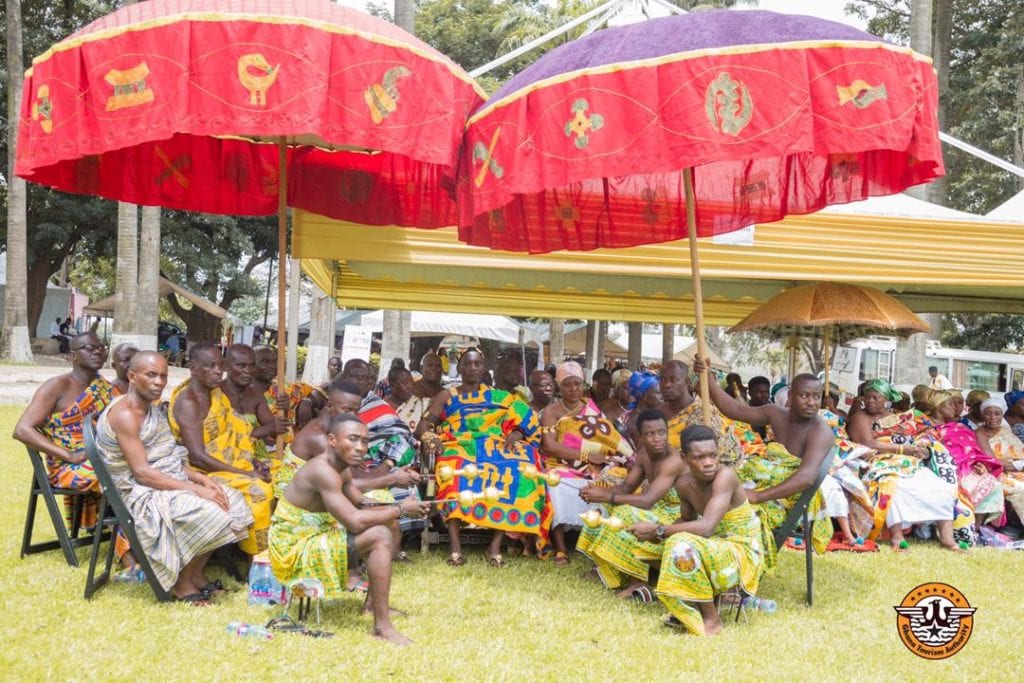
Kumasi, Sept. 27, GNA – Ghana is well-positioned to become the tourism destination in West Africa given the abundant resources and the prevailing peace in the country, Ms Barbara Oteng-Gyasi, the Minister of Tourism, Culture and Creative Arts, has said.
She said Ghana was increasing her investment portfolio in the sector for accelerated socio-economic growth.
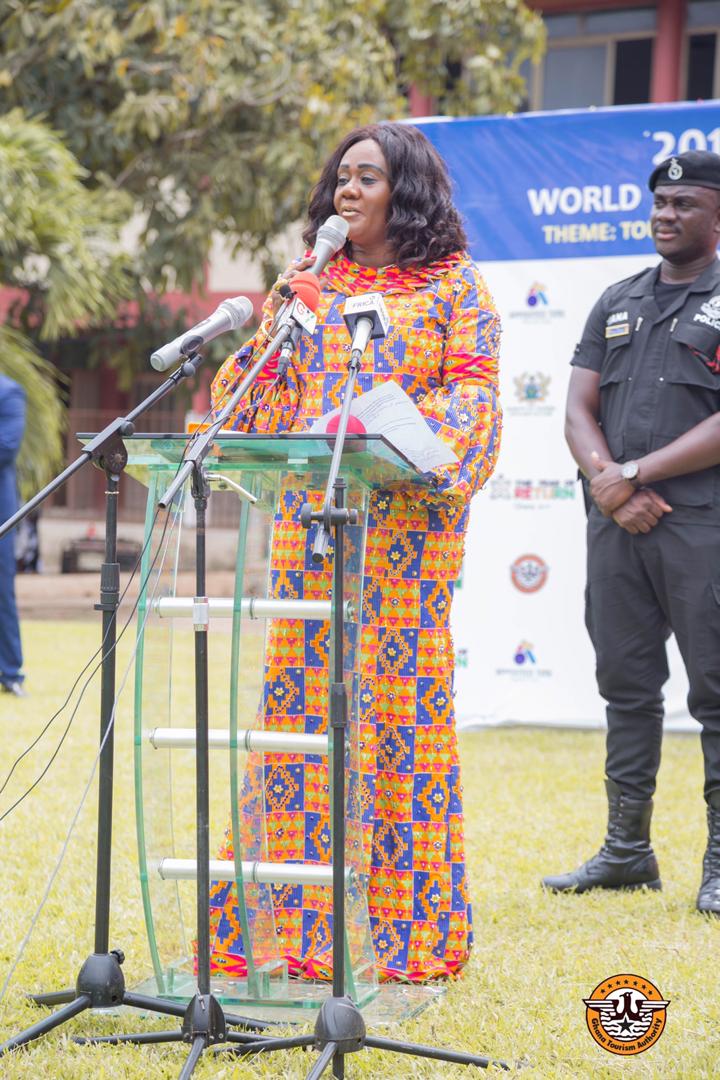
Ms Oteng-Gyasi, addressing Ghana’s commemoration of the 2019 World Tourism Day, in Kumasi, said the sector contributed about 5.5 per cent to the nation’s Gross Domestic Product (GDP) last year.
It currently employs over one million Ghanaians along the value chain with plans to increase the figure substantially in the near future.

This year’s celebration sought to create awareness on the potentials inherent in the tourism sector as a driver of economic growth and wealth- creation.
According to the World Tourism and Travel Council (WTTC), one out of 10 jobs globally is tourism-related.
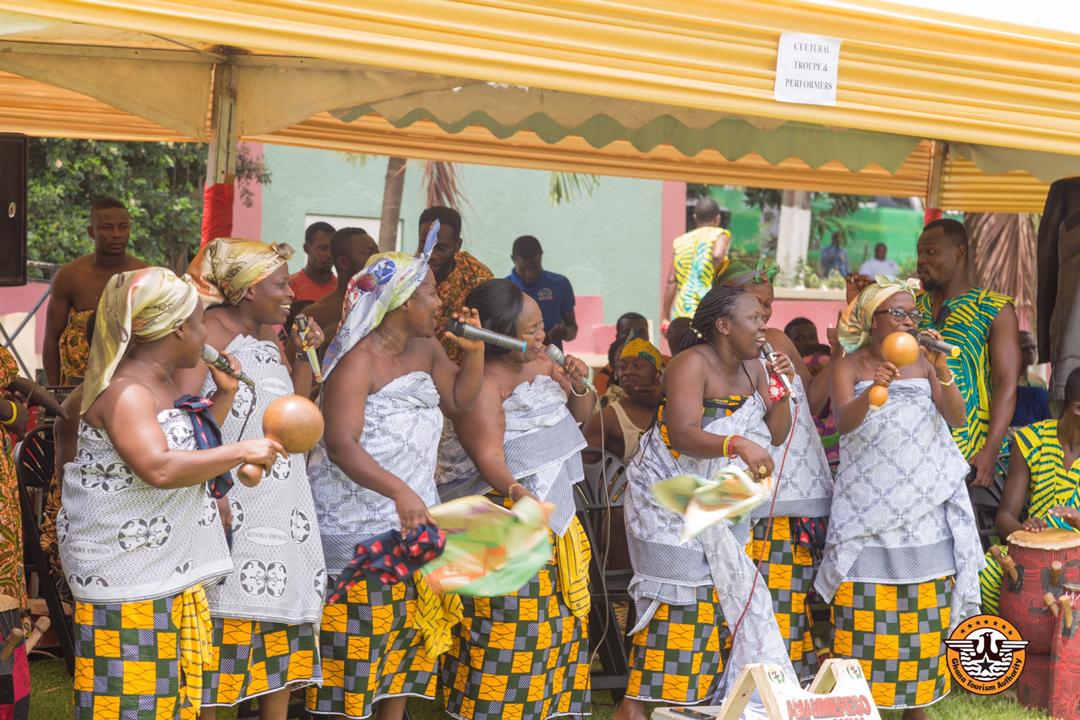
Ms Oteng-Gyasi hinted that the Marine Drive Development Project, as well as the numerous programmes being undertaken to upgrade tourist facilities, were intended to expand the frontiers of the sector.
This would help put those facilities in good shape to attract more visitors to the country.
Added to these are various initiatives to develop the skills of stakeholders for efficient service delivery.
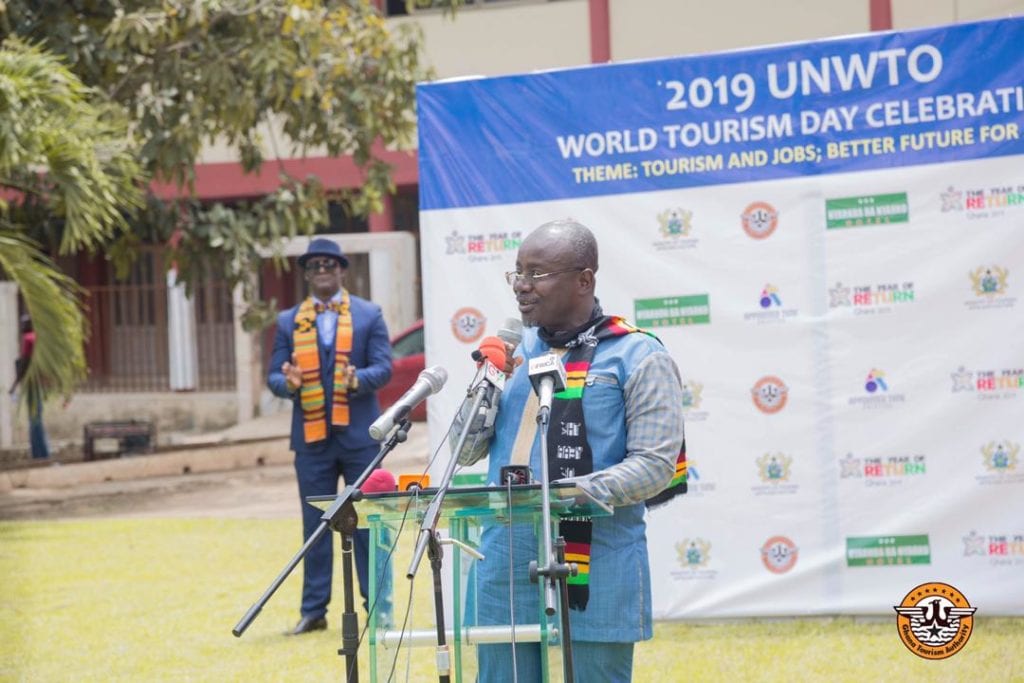
Mr Akwasi Agyemang, the Chief Executive Officer of the Ghana Tourism Authority, described this year’s Day as historic as it coincided with Ghana’s declaration of the ‘Year of Return’.
“We are welcoming our African brothers in the Diaspora back home after so many years living abroad,” he noted, adding that the occasion had brought enormous benefits to the nation.
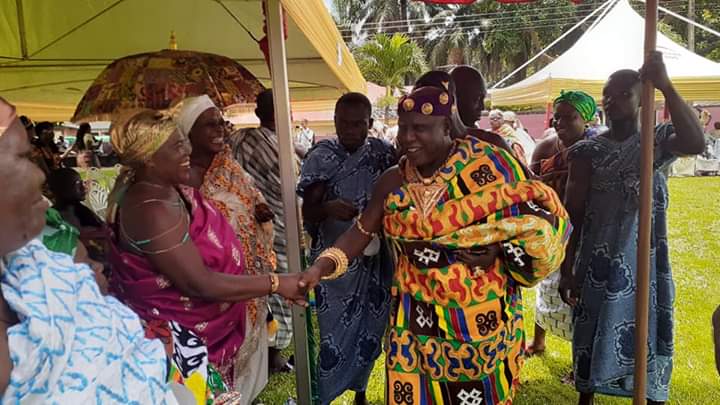
Barima Akwasi Offe Okogyeasuo, the Paramount Chief of Kokofu, said the nation must take tourism seriously, being the fastest growing sectors in the world.
Source: GNA
60-year-old giant tortoise on display at Ghana’s WTD celebration
Two giant tortoises stole the show at the 2019 World Tourism Day (WTD), held at the Centre for National Culture, Kumasi.
The two rare-species tortoises aged 40 and 60, were put on display at the ‘Wildlife Stand’ of the exhibition, to showcase the nation’s rich biodiversity.
Also on display was a royal python, a non-venomous type of snake.
The teeming participants, including some visiting Africans in the Diaspora, as well as visitors from abroad, could not help but visit the Stand to catch a glimpse of the animals.
Each weighing more than 50 pounds, the giant tortoises are some of the oldest rare surviving wildlife the nation could boast of.
Ms. Cornelia Danso, an Official of the Wildlife Division of the Forestry Commission, speaking to the Ghana News Agency (GNA), Kumasi, affirmed their resolve to protect wildlife.
This is because those animal species were vital components of nature which ought to be taken care of in order to prevent them from becoming extinct.
The Commission also exhibited a pictorial layout of the variety of animal species the nation was left with at her conservation sites and national parks.
Ms. Danso hinted that Ghana’s wildlife estate consists of 23 sites, made up of seven national parks, six resource reserve, two wildlife sanctuaries, five coastal Ramsar sites and one strict nature reserve.
“Seeing the potentials of these sites for ecotourism, the Wildlife Division has opened the map for domestic and international visitors,” she told the GNA.
The exhibition was held under the auspices of the Ghana Tourism Authority, displaying the various districts and their tourism potentials, especially in the area of cultural, geo and ecotourism.
“Tourism and Jobs; a Better Future for All,” was the theme for this year’s celebration.
Source: GNA
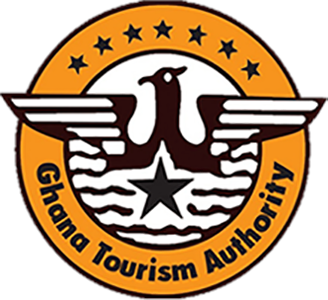

 Call Center
Call Center
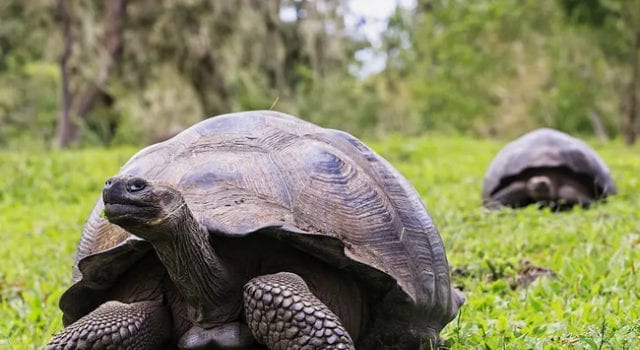

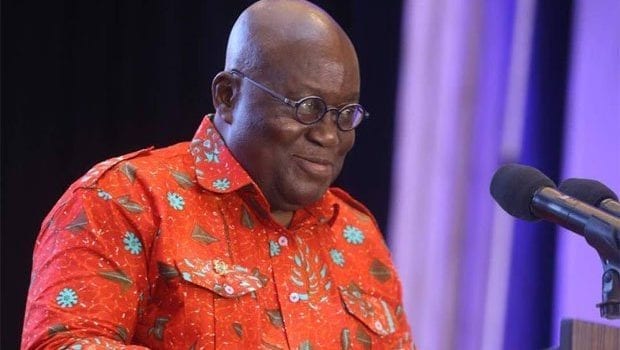


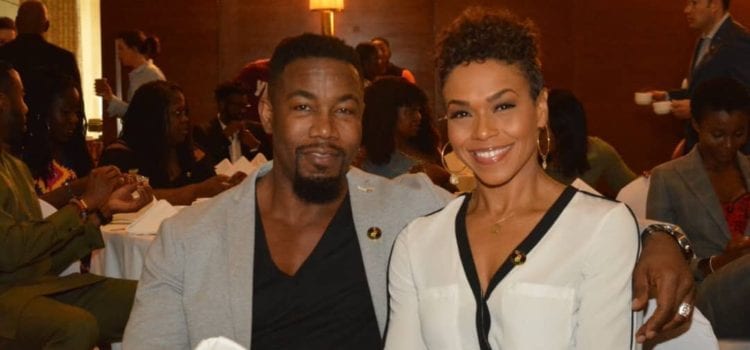
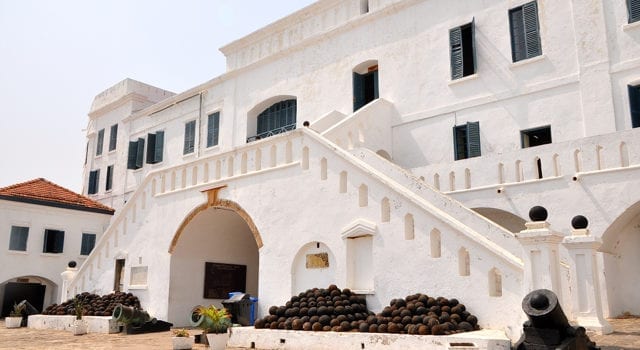
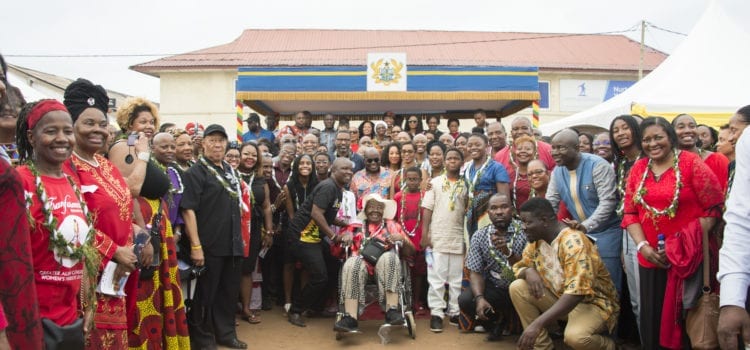
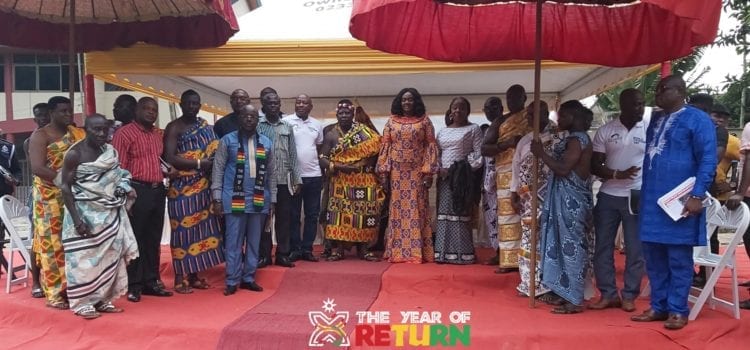
 Call Center: 0307007100
Call Center: 0307007100